Business, Social Media Marketing
Facebook Ad Policies – Why Your Ads Aren’t Getting Approved.
Facebook Ad Policies: Why Your Ads Aren’t Getting Approved.
Let’s face it: rejection hurts.
After all, we all crave approval—even if it’s just from the Facebook ad review team.
If you advertise on Facebook, you’ve probably received a notification like this at some point saying your ad “doesn’t follow Facebook’s Advertising Policies”:

All of a sudden, your dreams of a glorious Facebook advertising campaign come crashing down.
“Why don’t they want me?!” you scream, lifting your arms to the sky.
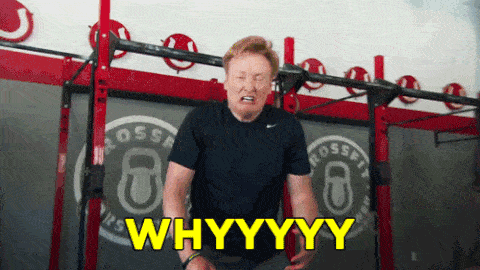
Okay, maybe that’s a little melodramatic. But you don’t have time for this—you need to get your Facebook ad out as quickly and easily as possible.
We’re here to help. There are 5 main reasons your Facebook ads are not approved, and we’re going into detail on each one so you know how to fix them—or create ads that don’t get rejected in the first place.
Here are the 5 most common reasons for Facebook ads being rejected:
1. You’re advertising something prohibited
2. You’re advertising something restricted
3. You’re not following community standards
4. You’ve made a mistake with your ad creative
5. You’ve made a mistake with your landing page
Also, here are 5 of the Most Common Facebook Advertising Mistakes. And if you’re marketing on Instagram too, avoid these Typical Slip-Ups With Instagram Ads.
To figure out which one it could be, it’s worth reviewing all 5. But if you have a sneaking suspicion as to where you could have gone wrong, feel free to skip to that section.
For example, if you’re promoting something potentially controversial, your ads may not be approved because…
1. You’re advertising something prohibited
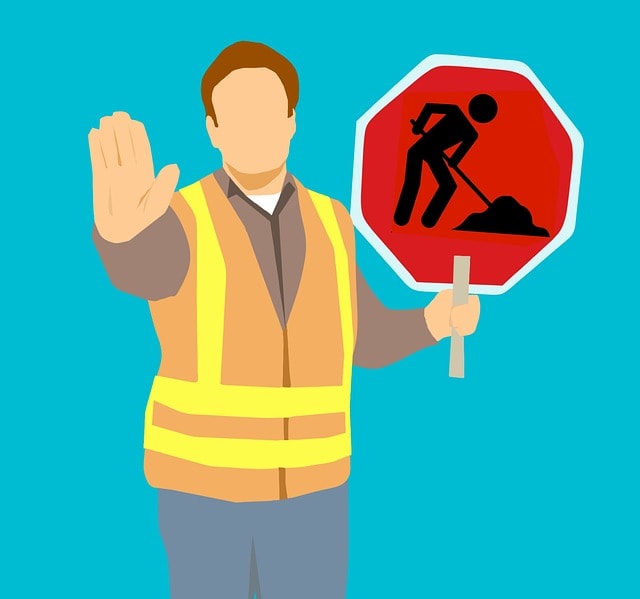
Facebook’s ad policies are pretty straightforward when it comes to what you can and can’t advertise. For example, no sex, drugs, or rock and roll (okay, rock is fine, but no sex or drugs).
Here are the products and services you can never advertise on Facebook. However, there are a number of exceptions you should be aware of.
Weapons, ammunition, explosives
No guns, bullets, or bombs allowed. Basically, you can’t sell anything that is intended to hurt other people. That being said, you can advertise blogs, groups, or websites about weapons, as long as they’re not specifically selling them.
Unsafe supplements
What counts as an “unsafe supplement” is totally up to Facebook. According to their ad guidelines, this includes but is not limited to the following: anabolic steroids, chitosan, comfrey, dehydroepiandrosterone, ephedra, and human growth hormones.
“Adult” products and services
No sex toys, dirty magazines, or “adult dating services”. Anything sex-related is pretty much a no-go unless it’s an ad for contraception or family planning.
If you’re advertising any form of birth control, make sure you exclusively target users over the age of 18 and focus only on the contraceptive aspects of the product.
Cryptocurrency

This addition to Facebook’s list of prohibited ad types only came out this January. Facebook’s Product Management Director Rob Leathern stated that cryptocurrency ads “are frequently associated with misleading or deceptive promotional practices.”
Surveillance equipment
This includes “spy cams, mobile phone trackers or other hidden surveillance equipment”. Pretty much anything you could use to spy on others is totally forbidden.
Payday loans
Payday loans, paycheck advances, or any other kind of high-interest, short-term loan intended to cover expenses between paydays are strictly forbidden on Facebook. These types of loans are frequently accused of taking advantage of people with lower incomes
Multilevel marketing schemes
If your ad is offering people ways to “get rich quick” or comes across as a pyramid scheme, it’s going to be rejected. To make sure your business isn’t incorrectly classified as a multilevel marketing scheme, you need to fully describe your business model in the ad.
Penny auctions
Ads for penny auctions and bidding fee auctions where people pay a small fee to “buy a bid” on an item are banned. This is because they are considered similar to online gambling and can be fraudulent.
Tobacco or tobacco-related products
You can’t sell tobacco products on Facebook. According to Facebook, that includes the following:
Tobacco or tobacco-related products, including cigarettes, cigars, chewing tobacco, tobacco pipes, hookahs, hookah lounges, rolling papers, vaporized delivery devices, and electronic cigarettes.
There are two exceptions to keep in mind, though. First, anti-smoking ad campaigns are fine. Second, blogs, groups, or websites that connect people with tobacco-related interests are alright as long as they don’t directly sell tobacco products or paraphernalia.
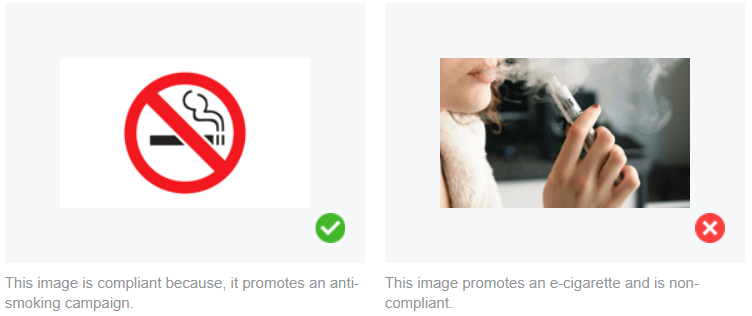
Anti-smoking campaigns are allowed on Facebook, but any other depiction of tobacco use is not. Source:
Pharmaceuticals
Facebook bans all ads depicting or selling drugs, even if they’re technically legal. So don’t try to sell prescription medication on Facebook.
Illegal drugs or drug-related products
Any recreational or illegal drugs are strictly forbidden from Facebook ads, and so are images or videos that depict their use. The one exception is ads for drug rehab programs and support groups.
Counterfeit documents
You can’t advertise illegal fakes of official documents on Facebook. You’d think that it would go without saying, but they don’t like it when you try to sell false passports, immigration papers, government IDs, or university degrees on their platform.
Spyware or malware
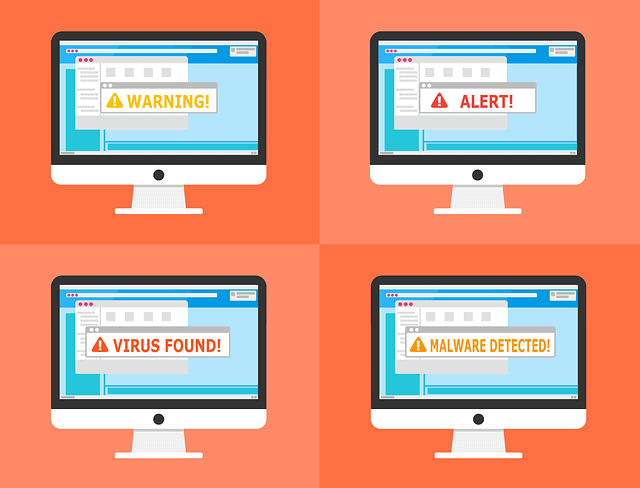
You can’t include spam, viruses, or harmful software in your ads, of course. You also can’t link to sites that contain spyware or malware.
Anything illegal, obviously
If the previous examples didn’t make it clear, you can’t advertise anything illegal on Facebook, period.
Looking to hire an Ocean’s Eleven-style team for your next heist? Sorry, buddy, you’re out of luck.
Sensational Content
This includes ads containing shocking or gory images that may scare the viewers. Facebook also prohibits ads that depict violence or threats of violence. This means if you have an image of a person pointing a gun at the viewer in your ad, well, you can kiss your ad goodbye.
Non-existent functionality
You can’t have imagery that replicates the features of a play button or a checkbox that does not work on your ads. For example, say if you’re having a static image with a play button on it. In that case, get ready to face some heavy rejection buddy
That about covers all the products and services prohibited by Facebook ad policy. But there are quite a few things that are only allowed under certain conditions.
That’s right, your ads could also be rejected because…
2. You’re advertising something restricted
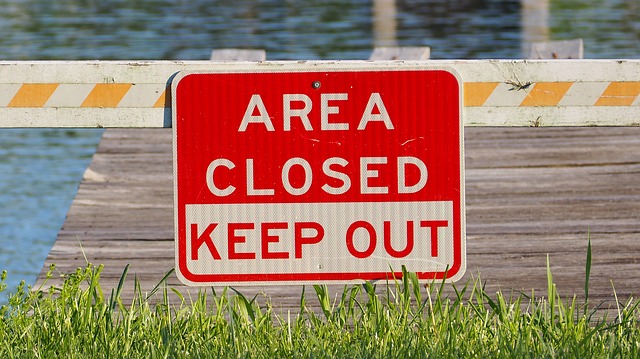
Here’s the deal: you won’t always have your ads rejected for trying to sell restricted products or services. That being said, only certain advertisers can promote this stuff, and often only in certain locations to adult consumers with prior written permission from Facebook.
This is the definitive list of ads that are only allowed on Facebook after meeting a set of requirements (and what those requirements are):
Alcohol
This is a big one. We love a good beer ad as much as the next person, but if you’re selling booze then your ads need to comply with the local laws of every country you’re targeting.
If alcohol is illegal in any of the countries you target, your ad is going right in the digital trash bin. Likewise, all users targeted must be 18 or older. If you’re in Canada, that’s 19. In Japan, it’s 20. And in the USA, it’s 21 and up only.
Dating services
You can promote an online dating service on Facebook as long as you meet a set of standards. First, you can’t encourage cheating—you can only target people whose relationship status is “Single” or “Unspecified”. Second, you must either target “Men” or “Women”. Third, you can only target adults 18 and older.
Also, keep your ads “PG”—any sexual content (implied or explicit) is not allowed, and you’re definitely not allowed to advertise mail-order brides/husbands.
There are even more specific requirements that you should keep in mind if you have your heart set on advertising your dating service on Facebook—which you can read on their website.
Real-money gambling

Dreaming of becoming a casino mogul through Facebook advertising? You’ll need written permission from Facebook’s ad review team first, and you’re only allowed to target users over 18 in locations where gambling is legal.
State lotteries
Ads for state lotteries are okay, but you’ll need to only target people within the state the lottery is in and comply with any local laws.
Online pharmacies
Yeah, ads for pharmacies are allowed, but only if you have a prior written permission.
Supplements
If Facebook doesn’t think your supplement is potentially dangerous (see “Unsafe supplements” above), you can advertise it exclusively to adults 18 years old or older.
Subscription services
Promoting anything that involves a subscription? You’re going to want to read this list of special requirements.
Financial services
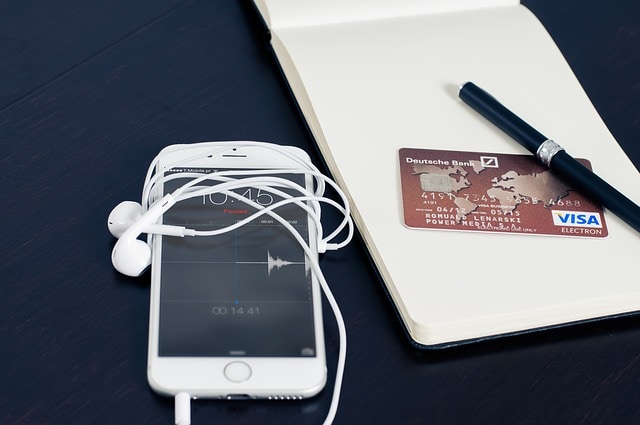
Are you in the finance game? All good, but to advertise your services you need to be careful about your landing page. No directly asking for people’s credit card or financial information, and you’ll need to be clear about any fees involved in your service right away.
Branded content
Facebook considers influencer marketing or any brand partnership with a content producer to be branded content. Branded content posts are totally cool with FB, but you’ll need to tag your product, brand, or business explicitly in the ad using their branded content tool.
Student loan services
This is pretty easy to grasp: only target users over 18 and don’t say anything deceptive, misleading, or fraudulent in your ad or your landing page.
Political advertising
Political ads are a hot-button issue on Facebook right now, and they’ve been taking steps to reform them internally. At the moment, you need to comply with all local election laws in the areas you’re targeting and go through a special authorization process to get any political ads approved.
Cosmetic Procedures and Weight Loss
These include adverts that market weight loss products and services and cosmetic procedures like rhinoplasty, hair implants, and dermabrasion that must be targeted to people aged 18 or older.
That covers all the restricted ad types. If your Facebook ad is still not approved, it could be due to the fact that…
3. You’re not following community standards
Okay, so you’re advertising something harmless that wasn’t even mentioned above, but the Facebook ad review team is not having it with you. Where did you go wrong?Introducing Facebook’s community standards. If you haven’t read them yet, we recommend reviewing them here or watching the video above.Here’s the shortened version of the standards Facebook uses to decide what content is allowed, whether it’s paid or organic.
Violence and criminal behavior
If your ad involves a real, credible threat, you will be banned. If it encourages murder, organized hate, terrorist activity, human trafficking, or any kind of criminal activity, you will be banned. If it publicizes violent crime, you will be banned. If it helps coordinate real-world violence, you will be banned.
Also, why would you do any of that stuff anyway?
Safety
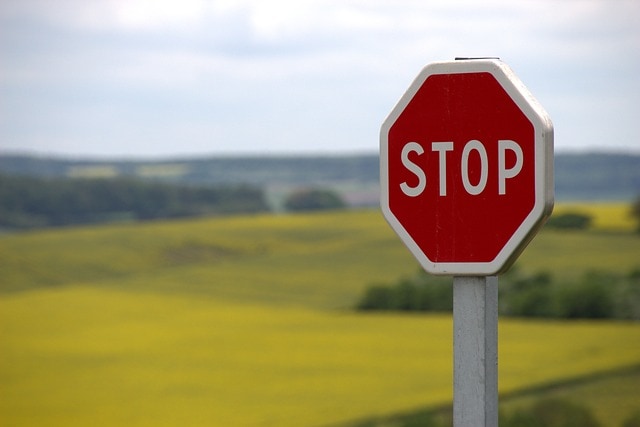
Any ads that encourage suicide or self-injury will be rejected, anything involving sexual exploitation will be rejected, any bullying or harassment with be rejected, and any content that spreads someone’s private or confidential information without their permission will be rejected.
Objectionable content
Any ads that promote hate or discrimination will be denied, ads showing graphic violence will be denied, ads with nudity or sexual activity will be denied, and ads that target victims of serious physical or emotional harm will also be denied (of course).
Integrity and authenticity
Facebook’s ad review team will reject any content it views as spam, including anything false or misleading or which gives a bad ad experience to users. They will also reject any paid or organic content promoting fake news stories.
Intellectual property
If your ad violates any existing copyrights, trademarks, or other intellectual property rights, it will not be approved. Here are the specifics on what counts as an IP violation.
If you don’t meet even one of these community standards, your ad won’t get very far. If you’ve read these backward and forward and you’re still not getting your ads approved, there’s a high probability that it’s because…
4. You’ve made a mistake with your ad creative
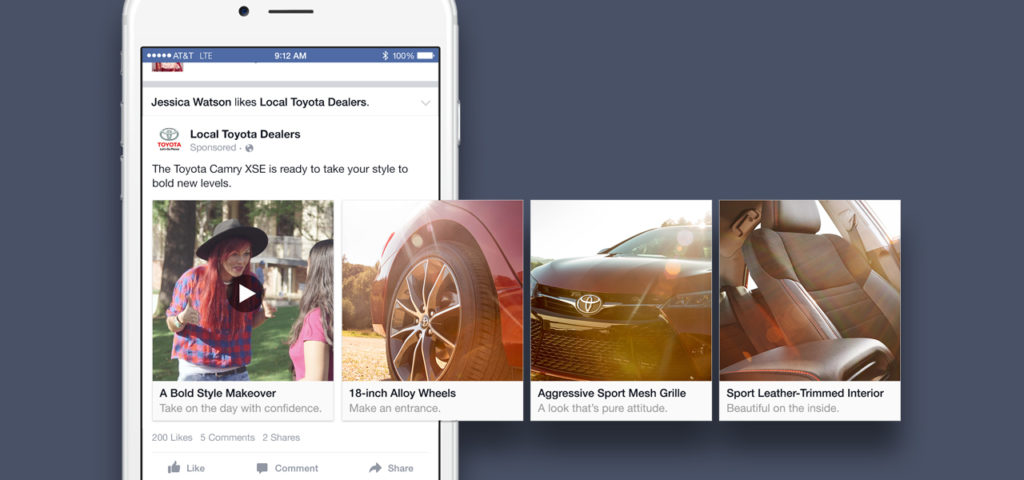
An example of a Facebook ad creative done right by Toyota.
You’re following all the community guidelines, you’re not advertising anything prohibited, restricted, or even controversial…so why is your Facebook ad still being denied?
There are quite a few rules you need to follow when crafting your ad creatives to comply with Facebook’s policies. If you mess up on just one, it could be the reason your ad was rejected.
Here’s a quick run-through on the most common mistakes Facebook advertisers make with their creatives:
Having too much text in your ad image “it will canceled in 2021”
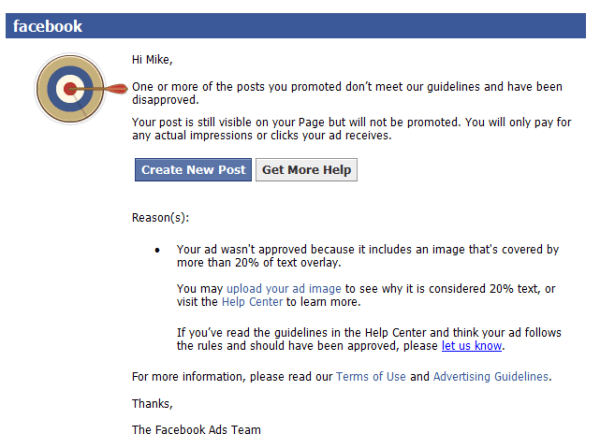
If you’ve received a notification like this, you’ll need to cut back on your image text. Source: Facebook via Mike Gingerich
This is a surprisingly common reason for Facebook ads to be rejected or have their reach limited. In fact, Facebook used to just have a cut-and-dry rule that if your ad image had over 20% of it covered in text, it would be denied.
Now, they will just scale back the reach of your ad based on how much of your image is covered in text.
Here are Facebook’s new tiers of image text acceptability:
Image text: OK – Your ad will run normally.
Image text: Low – Your ad’s reach may be slightly lower.
Image text: Medium – Your ad’s reach may be much lower.
Image text: High – Your ad may not run.
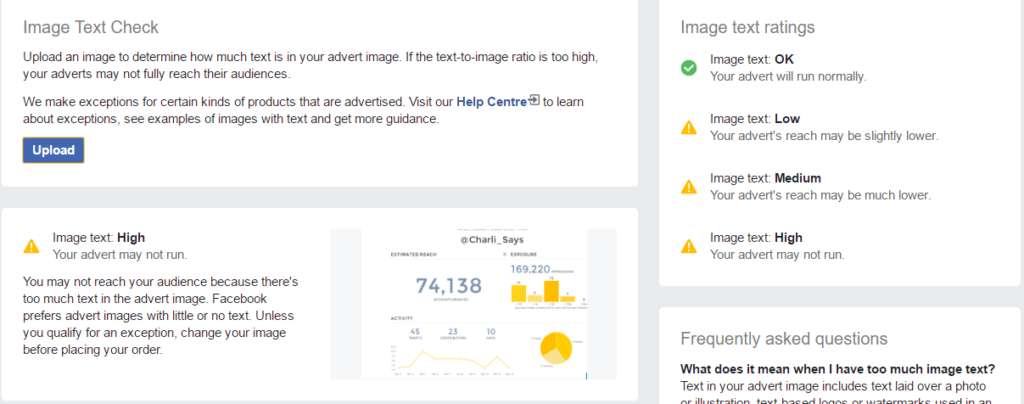
If your image Itext ratio is rated ‘High”, you should rethink your ad creative. Source: Facebook via Agorapulse
If you’re unsure whether you’re going to have your ad’s reach limited due to the amount of text it contains, try our free image text checker tool.
Targeting personal attributes
The funny thing about Facebook ad targeting is that Facebook does not want your ads to tell users you’re targeting them. We know, we know, that sounds confusing.
But here’s what it means: you can’t directly or indirectly tell users in your ad copy that you know anything about them.
Personal attributes include “race, ethnic origin, religion, beliefs, age, sexual orientation or practices, gender identity, disability, medical condition (including physical or mental health), financial status, membership in a trade union, criminal record, or name,” according to Facebook.
As a general guideline, avoid using words like “other”, “you”, “yours” in your copy. You can’t imply that you actually know anything about the users you’re targeting.
Here a few examples to help give you an idea:
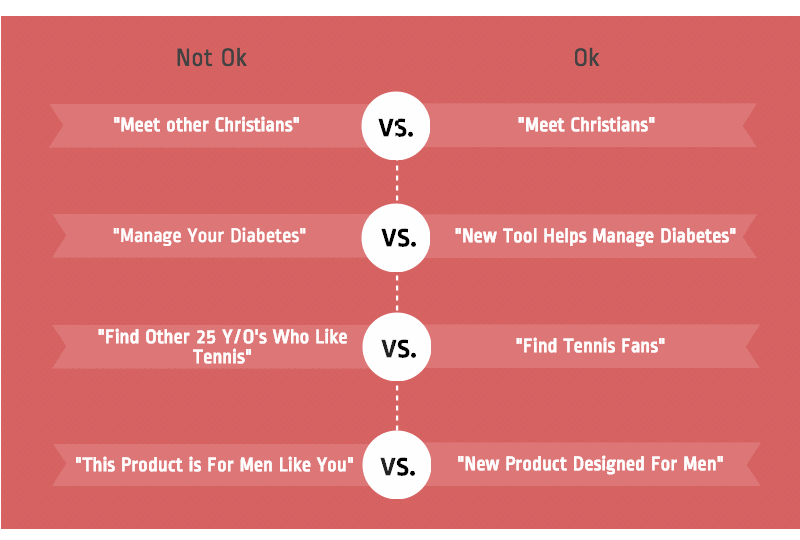
The key is to not make users feel like they’re being personally targeted. Source:
Misusing Facebook’s brand
You can use the word “Facebook” in your creative, and you can even use the Facebook logo, but you need to be careful about how you do so.
You need to capitalize “Facebook” and write out the full name in your copy. You can only use it as a singular noun, and it needs to be the same font size and style as the text around it.
You can use the standard Facebook logo, but don’t use their corporate logo under any circumstances. Also, don’t change any Facebook brand assets you’re using from their original design.
Finally and most importantly, you can’t use the Facebook brand as the central focus of your ad. Of course, you can promote a Facebook Page, group, or event with your ad, but you can’t advertise it in a way that makes Facebook the most noticeable and significant part of your ad creative.
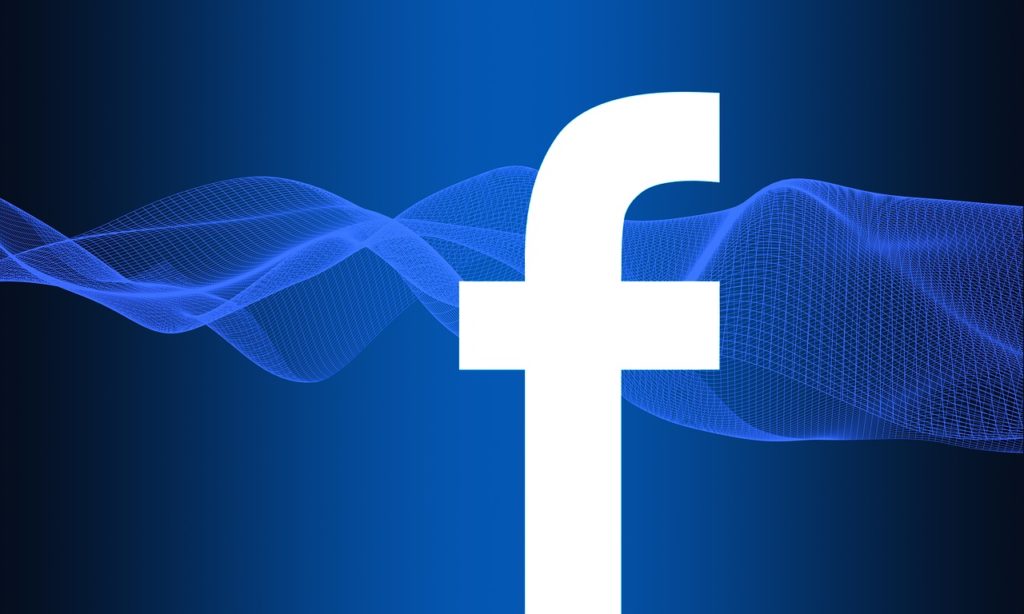
Making disruptive video ads
If you’re promoting a video ad on Facebook, you’re subject to some extra rules. First, no disruptive ad creatives like flashing lights or rapidly changing bright colors. Second, no content meant for adult viewers only without prior permission from Facebook. Third, no over-the-top displays of drugs, alcohol, sex, profanity, violence, or gore.
Promoting predatory ads
You cannot prey on vulnerable users with your ads. Basically, your ad creative can’t harass or bully anyone using Facebook’s targeting mechanisms.
Not being relevant
Every single component of your ad needs to relate to the product or service you are selling. Also, your ad creative needs to have some relevance to the audience you’re targeting with the ad. Finally, all details of your ad creative must be true and accurate.
Writing poorly
Facebook cares about the quality of user’s experience with its ads, which means it doesn’t want your ads to looks spammy.
This translates to grammar, punctuation, and capitalization too. Don’t use random capitalization or leave caps lock on when writing your ad copy. Don’t add extra punctuation marks like this?????!!!!!!
Don’t replace letters with emojis or random characters to get attention. And lastly, use a spellchecker and keep an eye on your grammar, as ad creatives with bad spelling and grammar will also not be approved.
Okay, if you’re complying with every rule we’ve listed above and you’re still somehow violating Facebook ad policy, now we know it’s probably because…
5. You’ve made a mistake with your landing page
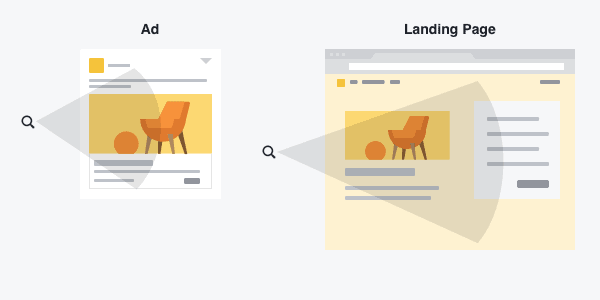
The landing page you link to is subject to the same policies as your Facebook ads. Source: Facebook
Just as important as your ad creative itself is the landing page you’re directing people to. If your landing page violates any of the Facebook ad policies mentioned above, your ad doesn’t stand a chance of being approved.
Facebook’s ad review team will look at a number of additional factors specific to landing pages to make sure yours is up to par, too.
Here are the landing page issues that could get your ad rejected:
But first, here are the 9 Most Common Landing Page Mistakes Marketers Make .
Ad URL doesn’t match landing page URL
Don’t try any funny business—if you include a link in your Facebook ad, that link needs to route users to a landing page with the same web address.
For example, if your link says “www.cutecatpictures.com” and it takes users to “www.piratedmovies.com”, Facebook’s ad review team will not be pleased with you.
This also includes unintentional typos in the ad’s URL, so double check your ad copy and your landing page to make sure they match before submitting your ad for review.
Landing page lacks business details
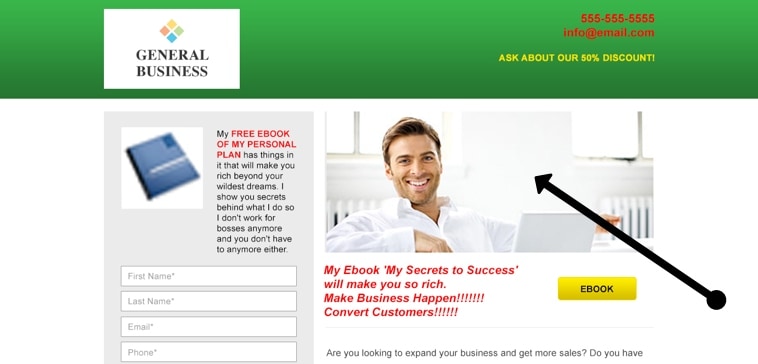
This level of detail isn’t going to cut it. Also, please never make landing pages like this. Source:
To establish trust with your business, you must include your business’s address, phone number, email, and privacy policy on any landing pages.
If there are any legal notices or disclaimers specific to your industry that you’re obligated to include, make sure they’re on your landing page too.
Landing page is false or misleading
You need to be totally honest and transparent with your landing page. You cannot include any misleading or false information about your products or services.
The page must also contain the product or service that the user expects based on your ad creative. For example, if you’re advertising bike repairs on Facebook and your landing page is selling sketchy supplements, you’re going to have a bad time.
Landing page includes disruptive or spammy elements
Your landing page, like your ad creative, needs to deliver a quality experience to any Facebook users that see it. For that reason, malware, scripts that prevent users from leaving the page, and pop up ads are all forbidden.
There is one exception when it comes to pop-ups, though. You may include them as long as the user intentionally clicks a button to make the pop up appear, like with a signup form:
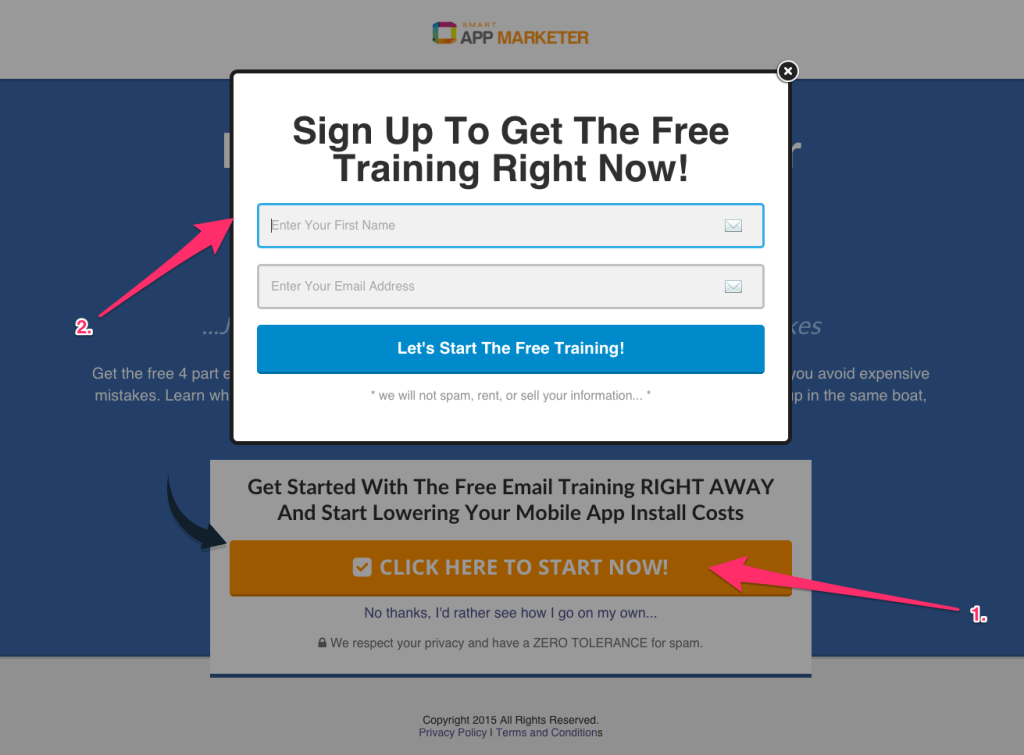
Pop-ups are only allowed if users click a button to open them on purpose. Source: Andrew Hubbard
Speaking of disruptive elements, auto-playing video or audio is forbidden, as are automatic downloads that start when your landing page opens.
Landing page is defective, unfinished, or a digital dead end
Your landing page can’t have bugs or appear “under construction” to Facebook. Broken links, unfinished media elements, and loading problems all fall into this category.
You also need to show Facebook that your landing page is connected to the rest of the internet. To do so, make sure to at least include internal links to the rest of your website.
One example would be placing a standard link menu at the top or side of your landing page:
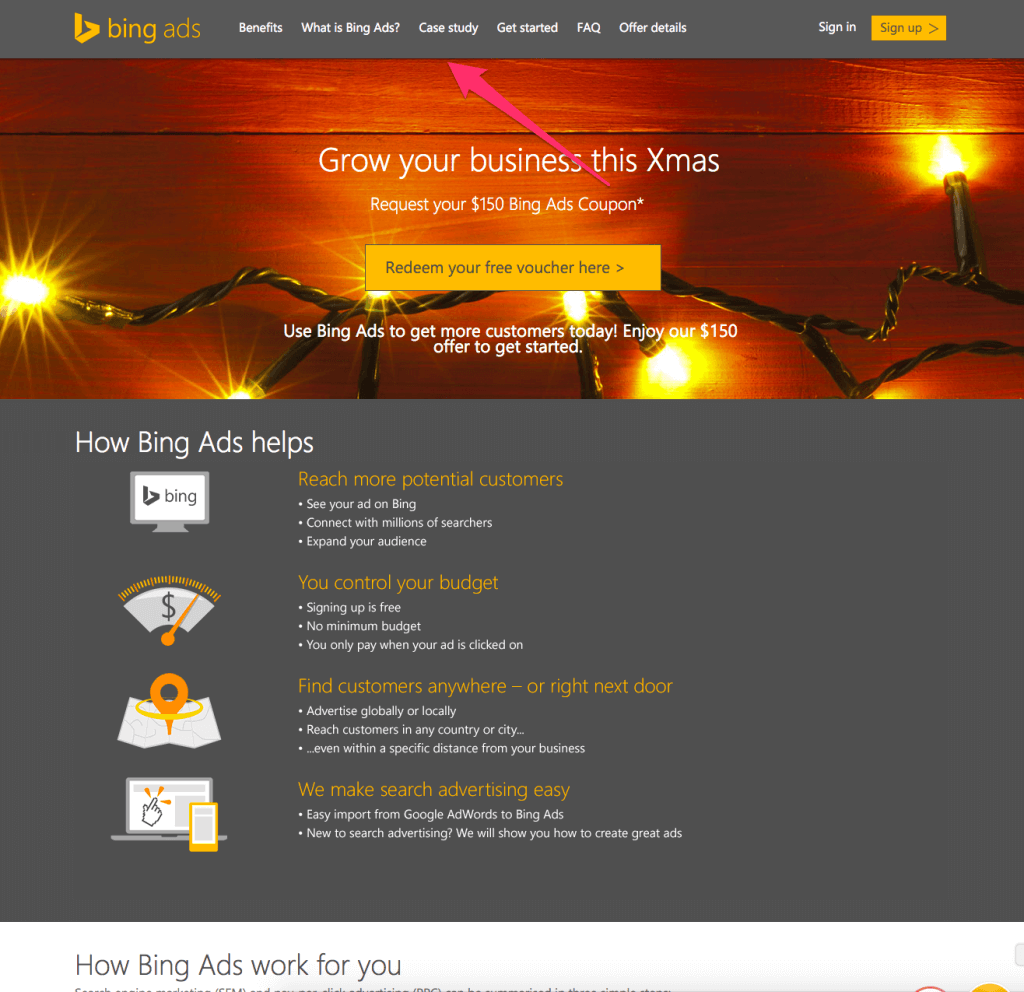
How to correctly link your landing page to the rest of your website. Source: Bing via Andrew Hubbard
Landing page doesn’t look like the ad creative
There needs to be some visual or textual connection between the ad and the landing page it links to. It’s a matter of signaling to Facebook’s ad review team straight away that your landing page is connected to your ad creative.
This could involve using the same copy, headline, or font from your creative somewhere on the page. It could also mean using a similar color palette or an identical feature image.
Overall, just make sure that an average user would see your landing page and immediately know it’s related to your Facebook ad.

 العربية
العربية